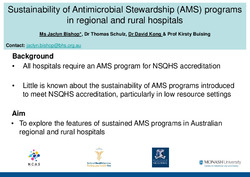Please use this identifier to cite or link to this item:
http://hdl.handle.net/11054/1493| Title: | Sustainability of Antimicrobial Stewardship programs in regional and rural hospitals. |
| Author: | Bishop, Jaclyn L. Schulz, Thomas Buising, Kirsty Kong, David C. M. |
| Issue Date: | 2019 |
| Conference Name: | Ballarat Health Services 2019 Annual Research Symposium |
| Conference Date: | 28 November |
| Conference Place: | Ballarat |
| Abstract: | Background Antimicrobial Stewardship (AMS) programs incorporate actions that promote the effective use of antimicrobials to optimise patient clinical outcomes, while minimising unintended effects including antimicrobial resistance. Since 2013, all hospitals in Australia must have an AMS program that meets the National Safety and Quality Health Service (NSQHS) accreditation requirements. Despite this, little is known about the sustainability of AMS programs in regional and rural hospitals. Objectives/Aims To explore the features of sustained AMS programs in Australian regional and rural hospitals. Method Lead AMS clinicians with knowledge of at least one AMS program sustained for greater than two years in a health service in regional or rural Australia were recruited. A series of interviews were conducted and the transcripts analysed thematically using the Framework Method. Results Fifteen multi-disciplinary participants consented to an interview including infectious diseases physicians (5), pharmacists (5), microbiologists (2), infection control practitioners (2) and general practitioners (1). The features of sustained AMS programs in regional and rural hospitals were: network or state-wide approaches to program delivery; passionate local champions; dedicated funding (e.g. human resources) for AMS; strong governance and accountability from hospital executive; adaptability to engage in new partnerships. Challenges to building AMS programs with these features were identified such as engaging hospital executive to allocate resources for AMS, managing staff burnout and formalising network arrangements. Implications/Outcomes for Planned Research Project The sustainability of AMS programs in regional and rural health services could be strengthened with explicit AMS staffing recommendations for regional and rural hospitals, greater support to develop formal network arrangements and a framework for integrated AMS partnerships across primary, aged and acute care. Final Thoughts Action to boost the sustainability of AMS programs in regional and rural hospitals is required. Through this qualitative process, action points were formulated which are practical and achievable. |
| URI: | http://hdl.handle.net/11054/1493 |
| Internal ID Number: | 01435 |
| Health Subject: | ANTIMICROBIAL STEWARDSHIP REGIONAL OR RURAL EFFECTIVE USE PATIENT OUTCOMES |
| Type: | Conference Presentation |
| Appears in Collections: | Research Output |
Files in This Item:
| File | Description | Size | Format | |
|---|---|---|---|---|
| 24. Bishop, Jaclyn.pdf | Powerpoint | 145.58 kB | Adobe PDF |  View/Open |
Items in DSpace are protected by copyright, with all rights reserved, unless otherwise indicated.
